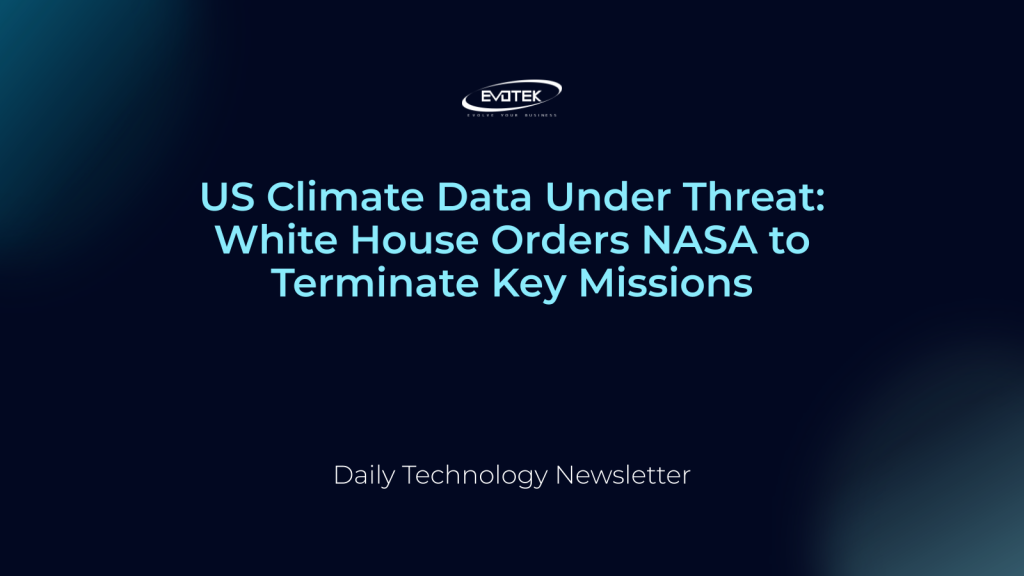The White House has reportedly directed NASA to initiate plans for ending two pivotal satellite missions focused on climate change research.
According to reports from NPR, officials from the Trump administration have contacted the space agency, urging them to develop termination strategies for the two missions, collectively known as the Orbiting Carbon Observatories (OCO). These observatories have been instrumental in gathering highly sought-after data, supplying essential insights to sectors like oil and gas companies and agriculture regarding carbon dioxide distribution and its impact on crop vitality.
Currently, one OCO satellite operates from the International Space Station, while the other functions independently. Should the termination proceed, the standalone satellite is projected to undergo atmospheric reentry, leading to its permanent destruction.
While the precise motivations behind the Trump administration’s directive to cease these missions remain speculative, observers point to President Donald Trump’s well-documented stance on climate change denial. This, coupled with the administration’s broader attempts to significantly curtail NASA’s science directorate, suggests a clear underlying agenda.
Compounding concerns, scientists involved with the projects informed NPR that both observatories were anticipated to continue operations for several more years. A comprehensive 2023 NASA review underscored the “exceptionally high quality” of the scientific data they have consistently delivered.
These observatories are crucial for providing precise, localized measurements of carbon dioxide, offering scientists an invaluable perspective on how human activities contribute to global greenhouse gas emissions.
David Crisp, a former NASA employee who contributed to the instrumentation of the Orbiting Carbon Observatories, revealed to NPR that he was recently contacted by current agency staff regarding the matter.
“They were asking me very sharp questions,” he said. “The only thing that would have motivated those questions was [that] somebody told them to come up with a termination plan.”
Crisp further argued that discontinuing “incredibly valuable data-returning NASA missions makes no economic sense,” highlighting the modest annual maintenance cost of just $15 million for both observatories – a negligible sum compared to the agency’s substantial $25.4 billion budget.
Reports indicate that other scientists who rely on data from these missions have also faced inquiries regarding their potential termination.
The threat to the OCO missions is not isolated; they are among dozens of space science initiatives imperiled by the Trump administration’s proposed fiscal year 2026 budget. This sweeping proposal has ignited widespread outrage within the scientific community, with many asserting it could dismantle the United States’ long-held leadership in space exploration and research.
In response, lawmakers have drafted a counter-proposal aimed at maintaining NASA’s budget largely consistent with current levels.
Senator Chris Van Hollen (D-MD), a leading appropriator, stated in July (as quoted by Bloomberg) that they “rejected cuts that would have devastated NASA science by 47 percent and would have terminated 55 operating and planned missions.”
Lawmakers caution that the termination of vital Earth-monitoring missions, seemingly driven by an anti-science agenda, represents a significant misstep and could potentially violate existing laws by overriding previously allocated budgets.
House Representative Zoe Lofgren (D-CA), ranking member of the Committee on Science, Space and Technology, informed NPR that “Eliminating funds or scaling down the operations of Earth-observing satellites would be catastrophic and would severely impair our ability to forecast, manage, and respond to severe weather and climate disasters.”
Lofgren further highlighted the administration’s attempt to impose proposed FY26 budget cuts on already appropriated FY25 funds, unequivocally stating, “This is illegal.”

 日本語
日本語 한국어
한국어 Tiếng Việt
Tiếng Việt 简体中文
简体中文